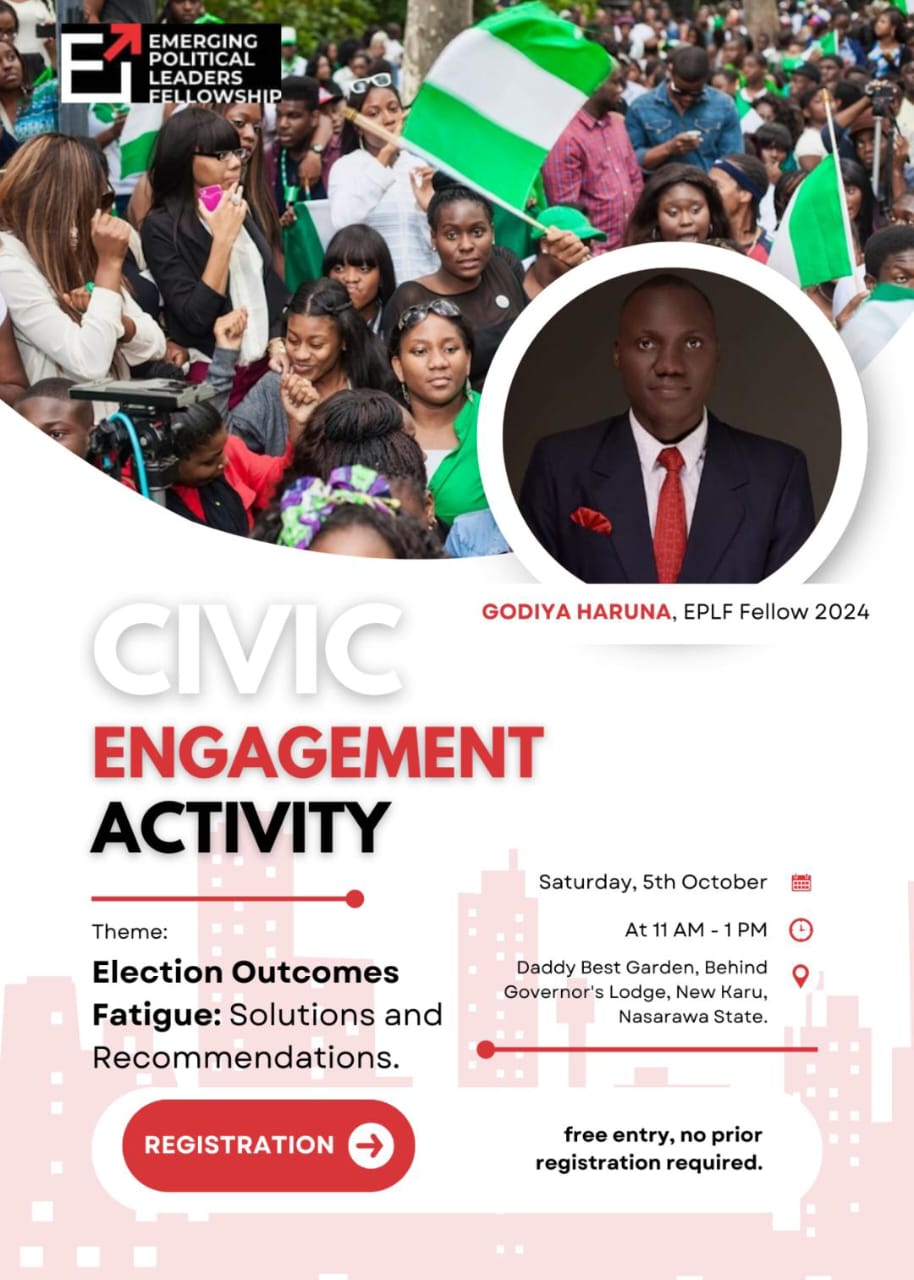On 5th October 2024, Godiya Haruna successfully carried out a civic engagement activity centred on the theme, “Election Outcome Fatigue: Solutions and Recommendations.” This activity, was designed to address the disillusionment many young Nigerians feel towards election processes, brought together over 10 participants, predominantly male, in the Ado community. The participants were a diverse group, with 8 males and 2 females, though none were Persons With Disabilities (PWDs).
Core Objectives
The activity aimed to cultivate a new generation of young LEADers who would be inspired to take up leadership roles and mentor their peers through intergenerational dialogue. Another key objective was to create a safe space for youth to engage in collaborative efforts that foster leadership and national development.
Key Outcomes
The engagement yielded several impactful results. Participants not only gained enhanced knowledge about the electoral process but also learned strategies to cope with the frustration associated with election outcomes. More importantly, many of them committed to becoming more actively involved in the political process moving forward. A key success of the event was the establishment of a safe environment where open and honest conversations about Nigeria’s challenges could take place. The event provided a safe platform for over 10 participants to discuss and collaborate on solutions to national challenges. It served as a crucial space for active citizenship, where young people could reflect on their responsibilities and how to foster change in governance. Pictures and videos from the event showcase the vibrant discussions and the commitment participants displayed.
Key Highlights/Achievements
Active Participation and Honest Conversations: The participants freely expressed their concerns and frustrations with Nigeria’s current political state without fear of judgment or intimidation. This open dialogue was a highlight of the event, offering a cathartic release and a foundation for renewed commitment.
Renewed Mindset and Commitment to Action: Many of the participants left the event with a stronger resolve to engage in politics, realizing that their collective actions can contribute to national change.
Plans for Future Collaborations: Participants established a “community of practice” that will serve as a hub for continued collaboration, mentoring, and support. This community will be a driving force for youth engagement and civic participation moving forward.
Lessons Learnt
Through the discussions, several key lessons emerged. A significant issue identified was the public trust deficit, where many citizens expressed disillusionment with the political system due to unfulfilled promises. This lack of trust has resulted in a noticeable decline in political participation. Voter apathy was another critical concern, with many participants sharing that past election outcomes and perceived lack of transparency had disconnected them from the political process. Some even admitted to abstaining from voting in recent elections. Despite these frustrations, patriotism endures among the participants, as they demonstrated a renewed passion for Nigeria and a commitment to engaging more actively in the country’s political future.
However, the event did face an unintended challenge: the turnout of youths was lower than anticipated. Despite efforts to raise awareness, youth disinterest and apathy remained significant obstacles to broader engagement.
To address these issues, participants made several recommendations to tackle election fatigue and improve political participation. They emphasized the need for greater transparency and accountability from both the government and citizens. One suggested solution was the adoption of the Option A4 open ballot system to ensure transparency and reduce the cost of elections. Continuous voter education should also be promoted through institutions like the National Orientation Agency (NOA), civil society organizations, and religious centres. Exploring a two-party system could help simplify the political landscape and foster more cohesive political ideas. Furthermore, participants urged political leaders to embrace effective social structures and advocate for reforms that would allow for the immediate transmission of election results, thereby preventing manipulation.
Follow-up and Next Steps
To ensure continuity, a Virtual Community of Practice was created on WhatsApp, allowing participants to stay connected and support one another in their civic and leadership efforts. In addition, physical meetings will be held monthly to provide mentorship, coaching, and networking opportunities focused on national development.
Several participants who previously lacked voter cards or had abstained from voting have now pledged to take an active role in future elections and in Nigeria’s governance process. This commitment marks the beginning of a new chapter of political involvement for these young Nigerians.
Through this civic engagement, Godiya Haruna has successfully planted seeds of hope, leadership, and action, paving the way for a more engaged and empowered youth population in Nigeria.

